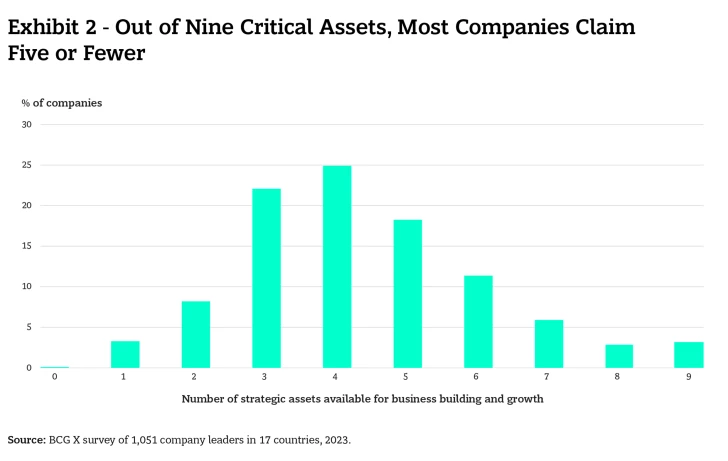For at least two decades, companies have assiduously built up their digital capabilities. They’ve upskilled their staffs and shifted product development to agile, multidisciplinary teams. They’ve embedded software in everything they sell, and they’ve invested in innovation and design thinking supported by enterprise-wide digital platforms.
The next step is to leverage these strategic assets to accelerate growth. Business building—whether inventing, launching, and scaling new business lines, units, and services or accelerating the growth of existing enterprises—is the most consistently successful way to do this.
It’s not just a matter of releasing additional products and services, adding a brand name, or even pursuing natural adjacencies. A company that builds businesses can repeatedly create high-growth opportunities through new go-to-market efforts, acquisitions, or entire new subsidiary companies.
Business building does not mean abandoning the stability of the core business. It involves finding new growth potential in existing capabilities—becoming, in effect, a continuous business-building company. This might sound risky, since many businesses fail. But digital capabilities can change the odds. Company leaders can feel confident about business building—if they follow a playbook based on proven results.
Priorities and Preparedness
BCG X recently surveyed more than 1,000 senior leaders in 17 countries about their business-building efforts. The findings show that companies are investing heavily in high-growth opportunities of this sort. Of the executives surveyed, 73% said that business building is a major priority for them, and their actions confirm it. Their companies have pursued, on average, five new high-growth opportunities each year since 2021. More than a quarter of these companies’ annual revenue is typically invested in launching, acquiring, or colaunching startup ventures.
Most of these company leaders said their business-building efforts were successful. Yet a closer look at the survey reveals a gap between individual efforts and sustained viability: Only 52% of the respondents said their companies are well-prepared to pursue new high-growth opportunities. While they have produced a few new businesses, they have not developed a consistent track record of business building. Even after a successful launch, they are not sure they could do it again—and thus they miss opportunities for further expansion. In short, making business building an immediate priority is no guarantee of long-term success.
Survey respondents generally attributed failures to externally driven factors: a poor market fit for their product or service, or the nonviability of the business model. Some also singled out internal clashes over the company’s direction, insufficient available funding, or the inability to recruit essential talent.
Companies with a record of sustained business building have shown they can address these factors, often in the early stages of a project. For example, to manage poor market fit, a company can actively test new offerings with customers before the launch. Much depends on preparedness—on having an array of strategic assets in place, along with the capabilities and leadership support for using them.
Nine Strategic Assets Critical for Success
In business building, a company’s strategic assets are the key elements that enable a launch to break through. Based on our experience launching more than 200 builds, we see the following nine strategic assets as most critically important:
- Intellectual property (IP), including patents, trade secrets, and methodology
- Data (drawn from inside and outside the company)
- Access to sales and distribution networks
- A strong brand
- A financial position with healthy cash flow
- A culture of innovation
- Strategic partnerships (with other companies, universities, community groups, and government agencies)
- The requisite technology
- Talent
You might expect a large company to have an edge in accumulating these strategic assets, given its resources and years of doing business. But most survey respondents said they have five or fewer of these assets available, and only 3% of the companies claim access to all of them. (See Exhibit 2.)

Even when they do have the assets, only half of the companies surveyed are effective in leveraging them to build new businesses. This explains some of the perennial difficulties large companies have in this sphere. Business building requires new ways of thinking and operating.
Getting There Early
The survey also asked company leaders about the time involved in business building. The responses revealed more cause for concern:
- On average, companies spend up to three years considering whether to add a new business to their portfolio. It then typically takes another three years to commercially launch the offering.
- Leaders are willing to invest for three or four years before the business needs to turn a profit.
These answers suggest a high level of patience. However, slow starts can leave value on the table. Moving quickly, especially in the early stages of building a business, usually leads to a higher success rate. Company leaders acknowledged that their launches are too slow:
- 48% of those surveyed said it would take them longer to release a product than it would take a startup.
- Among the leaders, a large majority identified two or three instances where their competitors launched businesses that they believe they could and should have launched first.
Lack of preparation is a root cause of this indecision and paralysis. A large company engaged in business building must develop stage gates that allow more rapid progress and less investment up front. There should also be a faster way to consider and reduce risks. These changes, in turn, require some new capabilities for the business.
If you are a leader of a company looking to capture growth, a well-designed preparedness plan could change your trajectory and accelerate your time to value. This plan would require investment in underlying capabilities, not just in the individual business-building efforts. For example, it would include a strategic examination of internal resources, talent strategy, and acquisitions. BCG X recommends three basic steps to start.
1. Get Prepared
The difference between a single launch and a serial launch capability is preparation. Do you have the capabilities you need to build businesses time after time? How do you stand up against your competitors? Do you have the governance structures and leadership you need to make business building a way of life? In short, do you have a plan for increasing your preparedness?
Take a sober look at your strategic assets compared to those of your competitors. Your rivals in the market may not have the same strengths you do, or even realize their value. For example, you might envy most startups for their speed, agile mindset, and multidisciplinary talent. But they don’t have the sales and distribution network that large companies have developed over the years. You can leverage that network as a massive accelerator for new businesses.











